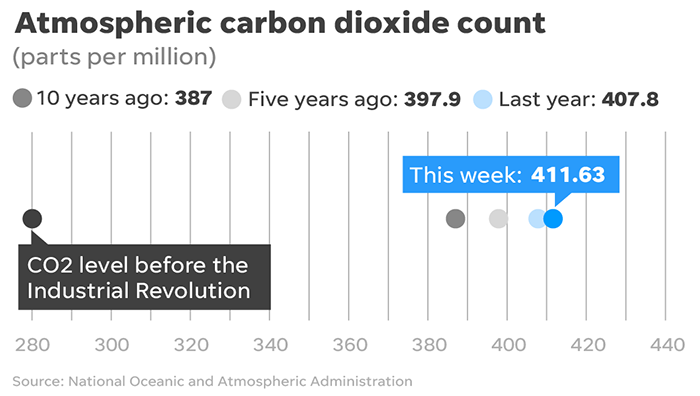Carbon dioxide in our atmosphere may soar to levels not seen in 56 million years

Emissions of carbon dioxide – the greenhouse gas most responsible for global warming – could soar to levels not seen in 56 million years by the middle of next century, scientists warned in a study Wednesday.
Though it won't happen in our lifetimes, it could very well happen in the lives of our grandchildren or great-grandchildren.
"You and I won't be here in 2159, but that's only about four generations away," said study author Philip Gingerich, a University of Michigan paleoclimate researcher.
He said humans pump carbon dioxide into the atmosphere at a rate nine to 10 times higher than it was during a natural global warming event roughly 56 million years ago.
That era, known by scientists as the Paleocene-Eocene Thermal Maximum (PETM), was Earth's warmest period since the extinction of the dinosaurs 66 million years ago. According to the study, during that period, the poles were ice-free, and the Arctic was home to palm trees and crocodiles.
That warmth caused a major extinction of organisms in the deep ocean that are a key link in the marine food web.
Scientists aren't sure what caused that spike in carbon dioxide during that era, but we know what's causing it now:
The burning of fossil fuels such as coal, oil and gas releases greenhouse gases such as carbon dioxide and methane into Earth's atmosphere and oceans. That extra carbon has caused temperatures to rise to levels over the past century and a half that cannot be explained by natural factors, scientists say.
"The rates of carbon release that are happening today are really unprecedented," said Gabriel Bowen, a University of Utah geophysicist.
The increase in gases such as carbon dioxide, methane and nitrous oxide is fueling climate change and making "the planet more dangerous and inhospitable for future generations," the World Meteorological Organization said.
More: Emissions of carbon dioxide into Earth's atmosphere reach record high
Experts said that to slow or stop carbon emissions and this unnatural warming of the planet, people, governments and businesses must reduce burning fossil fuels and shift to renewable, carbon-free energy.

"It's not just about 100 years from now; it's going to take significant periods of time for that carbon dioxide to make its way back into the Earth's crust," said Larisa DeSantis, a paleontologist at Vanderbilt University. "It's not a short-term event. We're really committing ourselves to many thousands of years of a warmer world if we don't take action quickly."
The study was published in Paleoceanography and Paleoclimatology, a journal of the American Geophysical Union.
This article originally appeared on USA TODAY: Carbon dioxide in our atmosphere may soar to levels not seen in 56 million years

